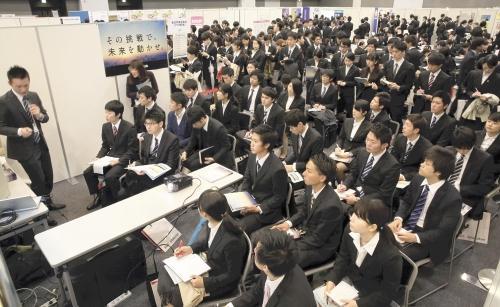
When it comes to Japanese job hunting, is it better to fit in or stand out? Hard to say.
就職活動
Different from a hunting job, which is a little more physical than I’d like.
In America
I’ve been looking for a job, on-and-off for the past month or so, applying to a few jobs every week. In that time, I’ve managed to secure a couple interviews. In general, I’ve assumed that the jobs that haven’t replied to me within a week are probably done with me. They’ve moved on with other candidates.
I ain’t bitter. It’s an intense, fast-paced world out there.
The fact remains that things move quickly. I can imagine the entire process from “application sent” to “first day” to be about a month at most, even keeping in mind that some jobs require relocation. For most companies, a slow hiring process means you miss out on a number of qualified candidates as they accept positions at other places. On top of that, usually positions are being advertised because the company needs that work to be done. The faster they get someone to do that work, the faster the project gets completed, the faster the next project gets started, the faster things move overall. In general, speed is the name of the game.
In Japan
Which is why the slow speed of the Japanese hiring process baffles me.
I haven’t actually been knee-deep in Japanese job hunting personally. The closest experience I have is with the JET Program. You might send an application in November, get an interview in January, learn you have the job in March, find your actual location in June, and fly out in end-of-July/early-August. That’s an 8 month process! 2/3rds of a year.
They can get away with that because the operation is massive and the number of candidates and positions is high. When people drop out of the process, there are a lot of people on stand-by, ready to take up that placement.
Some might think this slowness is because it’s a government operation, but that’s an unfair assumption. Fact is, same thing happens with many private Japanese companies.
The real reason it’s so slow: it’s so big.
If you’re going for a part-time position at a convenience store, you can probably sign up at the location itself. But if you want a full-time position, usually that means subjecting yourself to a month-long, complicated, often costly process.
Perhaps the most costly part: almost all interviews are on-site. If the job is in Tokyo, there’s no Skype interviews. You need to go down to Tokyo and pay for the travel expense yourself. When you have second and third interviews, and are applying for multiple jobs, it can get expensive quickly.

Gotta spend money you don’t have to get a job you might not get. Money to the void.
With all that said, I should to be clear here. Smaller companies move faster, and adults applying for jobs can get them within the 1-2 months that you’d expect in America. The biggest difference is for college students themselves.
Japanese College Student Job Hunting
College students in Japan care more about finding a job during their junior and senior years than completing classwork. Partially that’s because the process is so long and intense. A process called shuushoku katsudou (就職活動).
Job fairs and info-sessions tend to begin sometime in late junior year and early senior year. When my girlfriend was in college, the process was a little earlier. But since then, the companies decided to move the process more towards senior year. She was unclear whether or not this whole process was an agreement between the companies themselves or some top-down decision from the government that influenced the process, but the fact remains that most everyone works on a similar schedule.
So first are the job fairs and information sessions. Then, in June of senior year (Japanese school years are April to March), interviews begin.
Between June and October, students might get a nainaitei (内々定), which is essentially an unofficial statement that the company is looking to hire you. But, because of the agreements they’ve made with those other companies, they can’t make any “official” offers. A nainaitei is non-binding, but is generally assumed to be followed up by something official.
In October, students finally hear their results. Around this time they’ll get a plain naitei (内定), which when they sign, acts as an official promise of the job.
And then, in April, they begin their new job. Finally, the process comes to a close.
Experience
Perhaps the most interesting comment came up when I was discussing the issue of experience. As someone looking for a job in the game industry, my lack of experience working at a big company and lack of any commercial games under my belt is definitely my biggest hurdle. Though I have experience, I can look weak on paper.

In real life you can’t buy experience instantly. It’s all earned. Though sometimes you need to buy classes and books to help gain more experience, that’s true.
But there is a reason a lot of companies hire students. You see, students have something very important: a lack of experience.
This is apparently good for a Japanese company, especially one looking at hiring someone for a long-term, possibly lifetime position. Because while the lack of experience means that students have a lot to learn, it also means they’re coming into the job with a lack of preconceptions.
When companies hire older workers, there is a lot of “untraining” they have to do. Older workers think a certain way, it’s thought, and therefore might be more resistant to the culture and policies of a different company.
It makes sense. A friend of mine who is a big proponent of “agile” project management hates the fact that his company is moving to a “waterfall” management style. Aside from the fact that agile tends to be better for tech, the change in style is enough to cause problems that someone new to the field, without any notions of an ideal management style, might not have.
In any case, it struck me as interesting that a big Japanese company might look at the lack of experience as a boon. Certainly, I wish that were the case for me. But then, I don’t think I’d want to work for the crazy hierarchical schemes that Japanese companies tend to employ.
Two Weeks Notice
Finally, one other related topic to end on: quitting courtesy.
Unless stipulated otherwise in your contract, it’s possible to quit most jobs anytime. Not ideal, of course, for the company that hired you. But culturally, we’ve said in America that giving a two weeks notice to your boss is common courtesy. The idea of someone not showing up one day or quitting on the spot can seem rude.
But honestly thinking, two weeks is pretty short notice. To find someone to replace you in those next weeks is probably tough. On the one hand, maybe they want to get you out the door so you can’t see and influence the next person coming in. But most likely, a company wants there to be no break or gap in the workflow.
In Japan, a two weeks notice is short. One month? Okay. A one month notice works. But probably a two month notice is best.
And, gotta say I agree. Honestly, give your company time to deal with the issue.
That said, most times people quit a job because they’re planning on starting a new job somewhere else, and it’s already lined up. In this case, in our fast-paced world, it makes a lot of sense.
. . .
It’s always interesting the different ways different places deal with everyday things. Have you had any experience with a different hiring system? Or has your experience with the American system been vastly different from mine? Let me know!
Advertisements Share this:




